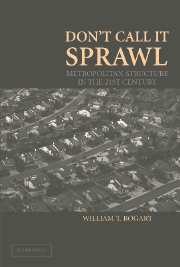Book contents
- Frontmatter
- Contents
- Acknowledgments
- 1 The World of Today
- 2 Making Things Better: The Importance of Flexibility
- 3 Are We There Yet?
- 4 Trading Places
- 5 Downtown: A Place to Work, a Place to Visit, a Place to Live
- 6 How Zoning Matters
- 7 Love the Density, Hate the Congestion
- 8 Homogeneity and Heterogeneity in Local Government
- 9 The World of Tomorrow
- Notes
- References
- Index
8 - Homogeneity and Heterogeneity in Local Government
Published online by Cambridge University Press: 02 December 2009
- Frontmatter
- Contents
- Acknowledgments
- 1 The World of Today
- 2 Making Things Better: The Importance of Flexibility
- 3 Are We There Yet?
- 4 Trading Places
- 5 Downtown: A Place to Work, a Place to Visit, a Place to Live
- 6 How Zoning Matters
- 7 Love the Density, Hate the Congestion
- 8 Homogeneity and Heterogeneity in Local Government
- 9 The World of Tomorrow
- Notes
- References
- Index
Summary
The franchise and the virus work on the same principle: what thrives in one place will thrive in another. You just have to find a sufficiently virulent business plan, condense it into a three-ring binder – its DNA – xerox it, and embed it in the fertile lining of a well-traveled highway, preferably one with a left-turn lane. Then the growth will expand until it runs up against its property lines.
In olden times, you'd wander down to Mom's Café for a bite to eat and a cup of joe, and you would feel right at home. It worked just fine if you never left your hometown. But if you went to the next town over, everyone would look up and stare at you when you came in the door, and the Blue Plate Special would be something you didn't recognize. If you did enough traveling, you'd never feel at home anywhere.
But when a businessman from New Jersey goes to Dubuque, he knows he can walk into a McDonald's and no one will stare at him. He can order without having to look at the menu, and the food will always taste the same. McDonald's is Home, condensed into a three-ring binder and xeroxed. “No surprises” is the motto of the franchise ghetto, its Good Housekeeping seal, subliminally blazoned on every sign and logo that make up the curves and grids of light that outline the Basin.
The people of America, who live in the world's most surprising and terrible country, take comfort in that motto.[…]
- Type
- Chapter
- Information
- Don't Call It SprawlMetropolitan Structure in the 21st Century, pp. 160 - 180Publisher: Cambridge University PressPrint publication year: 2006



